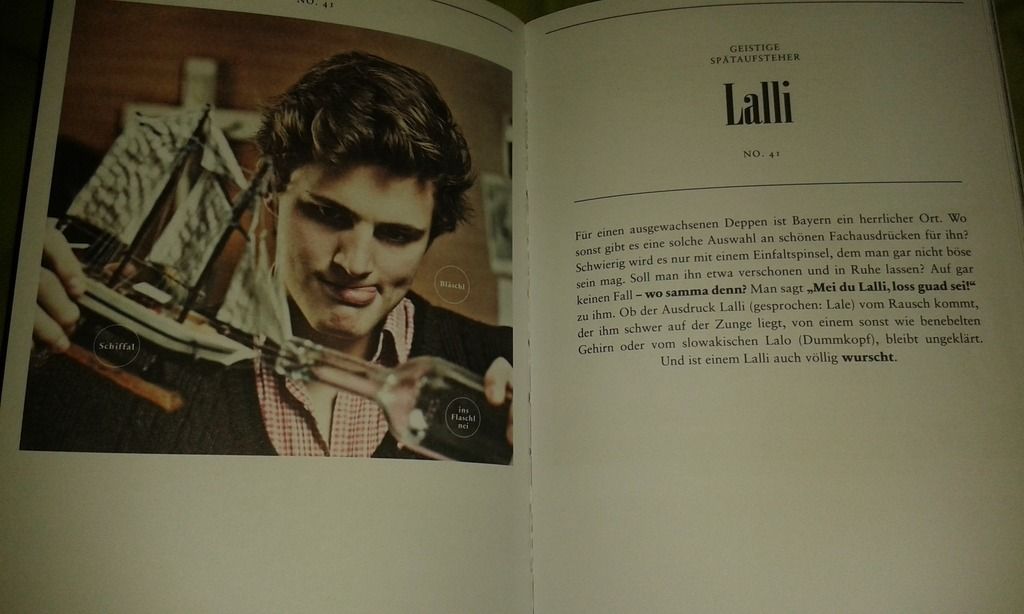Servus! Ich bin gerade erst zu diesem Thread durchgedrungen und würde gerne noch Niederbayerisch als Dialekt beisteuern! Laut deutschen Medien kann nicht einmal die NSA Bayerisch entziffern, es ist also spionagesicher! ^^
Zur leichteren Unterscheidung werde ich Bayerisch fett;
Deutsch kursiv; Englisch normal setzen.
Greetings! I just came across this thread and would like to offer some Lower Bavarian dialect! According to German media not even the NSA can decipher Bavarian (spoken OR written) so it is spy proof! ^^
For easier distinction I will put
Bavarian bold;
German italics; English normal
I wohn no hareantahoi da Doana und bin deszweng no koa Waidla sondan a Gaibonbiffe, oba i han de Erfahrung gmocht, dass mi assahoi vo am 30 Kilomeda Radius drozdem kaam mea ona vosteht.Ich wohne noch diesseits der Donau (uns zufolge nicht nur auf der rechten sondern auch auf der richtigen Seite) und bin deshalb noch kein Mensch aus dem bayerischen Wald (die selbst bei uns für ihren extremen Akzent berüchtigt sind, häufig als Beleidigung verwendet) sondern ein Gäubodenbewohner (wörtlich „Gäubodenkartoffel“ – eigentlich auch eine Beleidigung, aber ich mag das Wort^^), aber ich habe die Erfahrung gemacht, dass mich außerhalb eines 30 Kilometer Radius dennoch kaum mehr einer versteht.I live to the right side of the Danube (according to our believe “right” not only opposed to “left”) and accordingly I’m not a “Waidla” (person living in the Bavarian Forest, accused of having a subform of dialect even we can’t understand, also meant as an insult), but a “Gaibonbiffe” (person living in a certain area south of the Danube, literally “Gäubodenpotato” – actually an insult as well, but I like the word nonetheless^^), but in my experience hardly anyone understands what I’m saying outside of a 30 kilometre radius.
Auf Bayerisch zu fluchen und zu beleidigen wird bei uns wie ein kultureller Schatz gehütet. Die Süddeutsche Zeitung hat deshalb extra eine eigene Reihe herausgebracht, in der die schönsten und bildlichsten Schimpfwörter aus dem Altbayerischen zusammentragen und erklären sollte. Diese Reihe ist mittlerweile als Buch erschienen, und als ich darin den folgenden Eintrag fand wusste ich: ich muss es kaufen und die Seite hochstellen.To use swearwords and to insult (people) in Bavarian is cherished like a cultural treasure. The “Süddeutsche Zeitung” (a Bavarian well-respected, top-notch newspaper) published a whole series in which they collected and explained the finest and most figurative swearwords from Old-Bavarian. This series is available as a print anthology and when I found the entry below I knew: I had to buy it and upload the page.

Picture to the left:
Bläschl Zunge tongue
Schiffal Schiff ship
ins Flaschl nei in die Flasche hinein into the bottle
Text to the right:
Bavaria is a wonderful place for an outright moron. Where else is there such a vast selection of beautiful technical terms for people like him? But what to do with a simpleton (cuckoo/booby/patsy), one can’t really be mad at. Should one spare him and just leave him be? No chance – where do you get ideas like THAT? One says: “Oh Lalli, don’t bother!” [in terms of: please leave it alone, you will either hurt someone (including yourself) or destroy it, because you are too stupid, too drunk or too clumsy]. Whether the term Lalli (spoken: Lale [stressed on the first syllable; “l” like in “cloud”, “a” like in “after”, “l” like in “milk”, “e” like a long version of “e” in “egg”]) derives from a state of drunkenness, which weighs heavy on the tongue (German
“lallen” = slur one’s speech), from an otherwise dazed brain, or from the Slovakian word Lalo (dummkopf/blockhead), remains unclear. Nevertheless a Lalli couldn’t care less. [holy moly – didn’t expect this translation to be so tricky – the sentence structure sounds somewhat off, but… well ^^]
Ich kannte das Wort (habe es auch schon wiederholt selbst verwendet), aber niemals geschrieben gesehen und deshalb die Verbindung nie gesehen. (Anmerkung: in unserer Gegend fühlt sich niemand durch die oben genannten Begriffe beleidigt, sie werden in den meisten Fällen verwendet um zu frotzeln.)I knew the word (and repeatedly used it as well), but I’ve never seen it written and therefor never made the connection. (Note: in our region no one is really insulted by the words used above, they are used as friendly teasing in the majority of cases.)